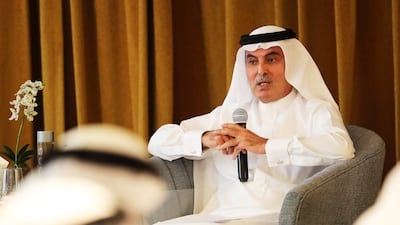Generous Arabs who give millions to charity every year could have a much more meaningful impact in the region if they embraced strategic philanthropy, billionaire businessman and philanthropist Abdul Aziz Al Ghurair has said.
This involves businesses or people focusing their charitable and generous activities around a particular issue or cause, aligned with set values and goals.
Mr Al Ghurair, who is chairman of Abdulla Al Ghurair Foundation, said Arab philanthropists should shift their focus from simply making large donations to looking to make a tangible difference in communities.
The foundation, one of the largest privately funded philanthropic initiatives in the Arab region, primarily concentrates on education and skill development.
“There are enough Arab philanthropists but I wish they shift from charity to impact and focus,” Mr Al Ghurair told The National in an exclusive interview.
“I want them to do that and more. You have to give your time, your energy, your wisdom, experience and your network to leverage all that. That is what strategic philanthropy is.
“Hopefully, if we can talk more and more about this around the Arab world, where they will shift from charity to impact, that will make a big difference.”
Mr Al Ghurair, who is also the chairman of Mashreq and chairman of the executive committee of Abdulla Al Ghurair Group of Companies, one of the largest business conglomerates in the Middle East operating in more than 20 countries, believes that the success of the foundation lies in its ability to influence other philanthropists.
DNA of giving
Mr Al Ghurair said the spirit of giving was instilled in him at a young age.
“I think the DNA of philanthropy is inevitable in this culture. I don’t know whether it was by accident or engineered by my father, who used to take me around in the '60s when he was giving Zakat money [compulsory charity prescribed in Islam] to people around. Slowly, that became part of my DNA and I thought it was fun.”

Mr Al Ghurair’s father Abdulla Al Ghurair – a prominent businessman and noted philanthropist – set up the first boarding school in the remote village of Masafi so that more boys and girls could have access to education.
His father also built a model school in Dubai, which today is one of the leading public schools in the UAE.
Charity needs no noise
One of the early lessons Mr Al Ghurair's father taught him was that charity should be done without making a lot of noise.
When he took over the foundation from his father, he said he applied the same philosophy as running his business and established its vision, mission, the key performance indicators and also made sure the best people were recruited.
"Giving time is critical. If someone says, 'Here is my money', I say, 'Don't give me your money, give me your time'," he said.
His message to aspiring philanthropists is to start early.
“You don’t have to wait until you make your first billion. You need to start on a smaller scale. Dh10,000 is better than nothing until you are 60 years old," Mr Al Ghurair said.
“Start with some small charity work where you know your organisation will have an impact. And gradually you will start learning.”
Foundation continues to grow
The establishment of Abdulla Al Ghurair Foundation in 2015 marked a turning point in his journey.
Mr Al Ghurair said his father felt the need to push the envelope and set aside one third of his assets to establish the foundation to improve the quality of education and help thousands of promising Arab youths from underprivileged backgrounds have access to quality education.
Over the next decade, the foundation spent Dh4.2 billion on helping to educate 15,000 Arab youths.
Mr Al Ghurair said the foundation evolved from a general charitable model to a more targeted approach.
Collaborating with top universities, the foundation identifies gaps and launches online learning programmes with certifications.
In 2018, he also established the Refugee Education Fund, which has already provided free secondary education and skill development to more than 62,000 refugee students in Gaza, Jordan, Lebanon, and Syria.
Today, the foundation's impact has reached 76,000 Emirati and Arab youths, according to its annual Impact Report for 2022 released on Thursday.
It also said the foundation had a positive impact on the lives of 26,000 youths, marking a 40 per cent increase from the previous year.
Syrian refugee children find hope at centre in Jordan's capital - in pictures











